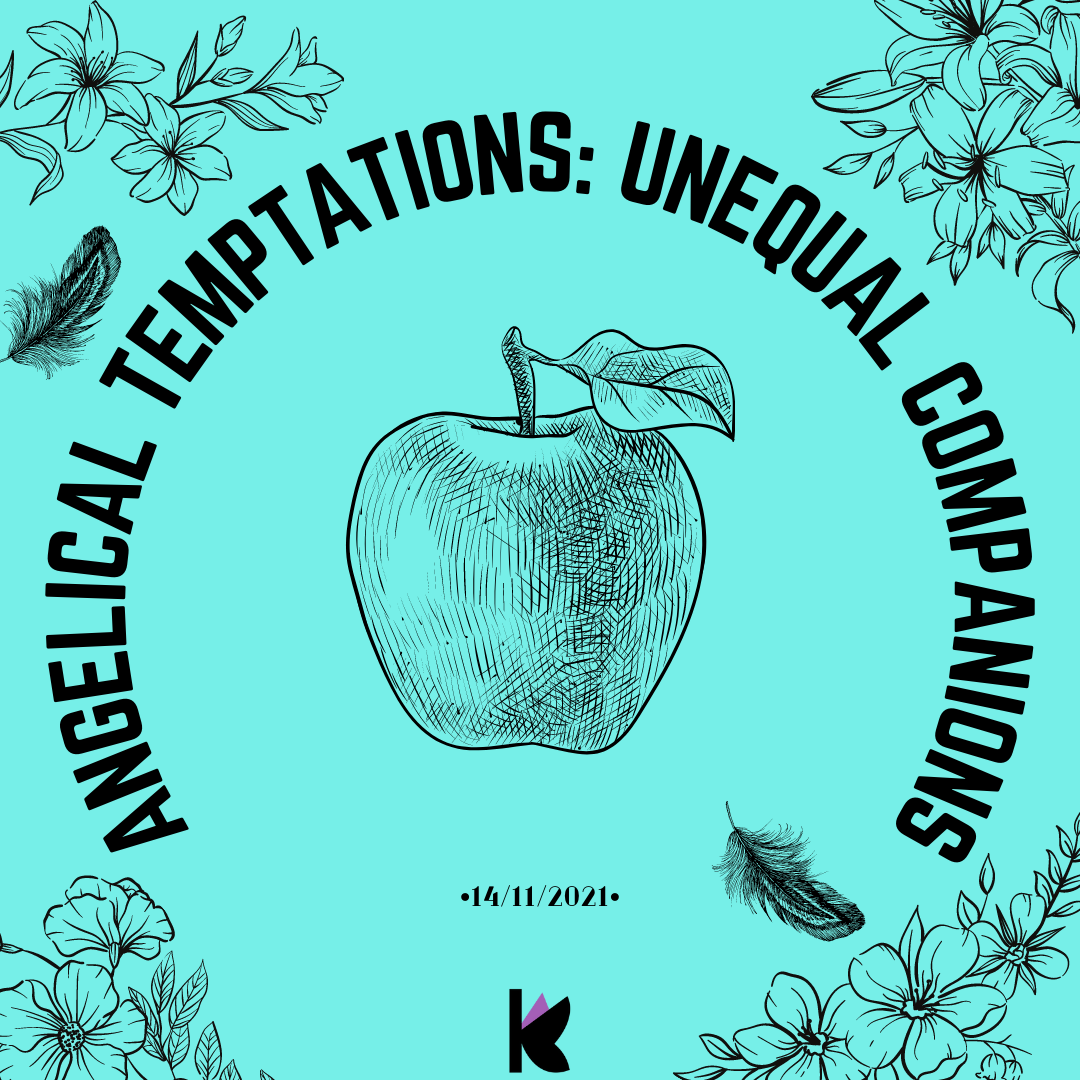
Yet another analysis about Adam and Eve.
About this essay
It was submitted on December 3rd, 2019 to Concordia University’s English department. But I’ve done my best to adapt it for a pleasant web reading experience.
Cite this essay
To quote or cite this essay copy the following text and make the adequate adjustments:
Trujillo, Axel. “Angelical Temptations: Unequal Companions.” Editions Krizaliz, Date, URL.
It all begins with a question.
If Adam and Eve were created as equal and fit companions, shouldn’t they both be tempted in the same way, by the same fallen angel into committing the same sin?
Well, Adam is in fact tempted by an angel and the object of his temptation is something that if consumed will make him “fallen.”
But it is not Satan and the object of his temptation is not a fruit.
It is the angel Raphael who tempts Adam and the object of Adam’s desire is similar to the object of Eve’s desire which comes from the tree of knowledge.
Adam and Eve are not equal because Satan tempts Eve with Inner knowledge while Raphael tempts Adam with Outer knowledge.
Eve wants to know more about herself but Adam wants to know more about the world.
But why? Why are Adam and Eve, equal companions, tempted differently by different types of angels?
The goal of this essay is to prove that Adam and Eve are not equal because they are tempted in a different way. I have to analyze their hierarchy which encompasses their place in the world as the newest creation in the garden of Eden, and the authority that each possess as well as their pursuit of knowledge which drives their actions and informs their respective trials and temptations.
Did I lose you there? I apologize. I’ll try to make this 9 pages essay read like an instagram ad.
As discussed in the essay “The genesis of gendered subjectivity in the divorce tracts and in Paradise Lost” Mary Nyquist argues that Milton chooses to portray man’s creation, that is man and woman, as separated events with a specific chronological order.
Man is created first and Woman is created after him, but their creations are also presented in an order that is different from the chronological order.
Adam is created first but the actual telling of his creation comes after the tale of Eve’s creation who is herself created after Adam.
Book 4 tells the creation of Eve while Book 8 tells the creation of Adam.
Milton must have been aware of the different feminist readings and reinterpretations of the Genesis story that frame Adam and Eve’s creation as a singular event told in different parts however, he chooses to write Adam’s creation as the creation of man in God’s image and Eve is presented as his companion, created in Adam’s image.
Just by considering the chronological order of both creations, the first assumption one could make is that since Adam was created first then he has a higher hierarchical position.
Or, instead of seeing Eve as a secondary creation one can see Eve as the latest creation, making her not secondary to Adam but instead a newer and perfected version of Adam since she is created not from clay and dust but instead she is made out of a more refined material (bone), making her superior in the hierarchy of Eden (Miller, 153).
Adam and Eve are not created equal considering the chronological order of their creation.
One will always be the first while the other is a secondary creation. But if Eve is created to be the latest creation and not a secondary creation then why isn’t she the one to whom Adam must be submissive to?
If she is truly a more refined version of “man” why does Satan targets her and not Adam?
Perhaps the types of temptations they each have to face has more to do with the authority Adam and Eve posses and less with their status as primary or secondary creations.
Adam and Eve are both created to be companions. Right?
They share responsibility and authority over the garden of Eden. Right?
As Sharon Miller notes, Adam and Eve are first presented through the eyes of Satan, they are already created and they already tend to the garden. The description used by Milton is a combination of Genesis 1 and 2 because it presents Adam and Eve as “co-equal by granting them both “equal majesty” such as they seemed lords of all” (Miller, 154).
Satan sees them standing together but recognizes the apparent incongruity of them standing together, as equals, because he knows one has to be superior to the other. Interesting isn’t it?
(Just as God is superior to him!)
Satan notes the differences between Adam and Eve:
“Not equal”, “For contemplation he”, “For softness she”
Paradise Lost (4, 296-298).
Satan exists outside the structure of authority of Eden but recognizes that Adam has a higher authority than Eve, “His fair large Front and Eye sublime declar’d/ Absolute rule” (4, 300-301), this is partly why Satan targets Eve, since she is inferior and represents an easier prey, “impli’d Subjection”, “by her yielded, by him best receivd/ Yielded with coy submission” (4, 307-310).
To Satan, both of them are made in the image of God “in thir looks Divine/ The image of thir glorious Maker shon” (4, 291-292) which means that if he wishes to hurt God, all he needs to do is target the one that has the least amount of power and authority, that being Eve.
But despite their apparent differences to the outside viewer (us and Satan), Adam does regard Eve as an equal companion, “Authority and reason on her wait/ As one intended first, not after made” (8, 554-555).
Adam perceives her as someone who carries herself with the same dignity as him.
It is partly the fact that Adam sees Eve as an equal which contributes to his fall, “Thou did’st resigne thy Manhood, and the Place/ Wherein God set thee above her made of thee/ And for thee” (10, 148-150). But he is proven wrong as these lines reinforce the notion that Eve is a secondary creation, lower than he is on the hierarchical structure.
Even Eve is aware of her place in the hierarchy of Eden since she refers to Adam as her “Guide” and “Head” (4, 442-443).
Even though Adam and Eve share a responsibility of tending to the garden of Eden, they are not equal, since they are viewed differently by God, Raphael, Satan and even Eve herself. They are not considered equals by the structures of power which govern their existence and this poem is presenting this notion and exposes the problems of following such a gendered hierarchy and of considering women as secondary creations (Miller, 162).
There is something curious about Eve knowing her position in the hierarchy of Eden while Adam does not.
Why is Eve aware of something that only the angels, Raphael and Satan, as well as God know?
Wouldn’t that put her higher in the hierarchy of Eden, since not only is she created with the same understanding of the world around her that Adam has but her understanding goes beyond that?
Eve is capable of naming things in the garden just like Adam.
She names the flowers while he names the animals. One could argue that the poem does not show her naming anything, and the inclusion of said power exists just to give Eve some sort of gimmicky-power over Eden, it is nevertheless there and must be analyzed with the same scrutiny as the rest of the poem.
To understand Eve’s knowledge of herself we must understand Adam’s knowledge.
As John Leonard puts it in his essay “Language and Knowledge in Paradise Lost”, Adam’s knowledge comes from his power of “perfect understanding” which is how he “names” things in Eden, through the understanding of their essence.
As Adam recalls his creation, he explicitly states that despite his power and dominion over all things which allows him to understand the essence of all things in Eden, he is unable to name himself.
He does not know from where he comes from or why he is there:
But who I was, or where, or from what cause/ Knew not; to speak I tri’d, and forthwith spake/ My Tongue obey’d and readily could name/ What e’re I saw
Paradise Lost (8, 270-273)
His perfect understanding of things around him does not extend to himself!
He asks the world around him to let him know from where he comes from:
Ye Hills and Dales, ye Rivers, Woods, and Plaines/ And ye that live and move, fair Creatures, tell/ Tell, if ye saw, how came I thus, how here?
Paradise Lost (8, 275-277)
The first thing Adam wants to know is more about the world because that is how he understands who he is, that is why Adam looks up unlike Eve who looks down.
Adam doesn’t know his name, his understanding of himself is incomplete because he doesn’t know his essence and “To name creatures in Paradise was to know their essences, not just to assign convenient designations” (Leonard, 131).
The first thing Adam learns about himself is the fact that he is effectively alone. “Seeing the animals grouped “two by two”, Adam becomes aware of his own need for fit companionship” (131).
Adam learns of the animals’ “fitness or unfitness” through the act of naming them, “Each with their kind, lion with lioness/ So fitly them in pairs thou hast combined” (8, 393-394).
He learns through experience not only what they are but also what they are to each other.
He understands that the animals are created fit to each other which leads him to understand that he has no fit companion, not an equal but a companion that fits him as the lioness fits the lion.
Through observation Adam acquires outer knowledge that helps him understand himself.
But Adam’s power of understanding comes with limitations.
As he is naming the animals, he realizes that although he can understand their essence and name them, he cannot understand the essence of God.
And to the Heav’nly vision thus presum’d/ O by what Name”
Paradise Lost (8, 356-357)
Adam cannot “name” God.
The most important being and object of adoration is unknowable to him.
Adam cannot learn anything from God because he cannot understand God and that prevents Adam from understanding himself.
He is told that he is the image of God, “for God on thee”, “hath also pour’d/ Inward and outward both, his image faire” (8, 220-221).
Adam is made in the image of a being whom Adam cannot “name” and from whom learns nothing about himself. He is trapped in a paradox because he is an image of someone unknowable to him, which in turn makes Adam unknowable to himself.
He is stuck in a position of not being able to learn or understand who he is.
This forces Adam to take a different path that will help him understand himself and that is through the pursuit of Outer knowledge which is knowledge about the world.
If Adam cannot understand God then he will understand everything else.
Which is why Adam asks Raphael to tell him everything about The Creation in book 7:
what cause/ Mov’d the Creator in his holy Rest/ Through all Eternitie so late to build”
Paradise Lost (7, 90-92)
He is not asking about the origin of the universe out of curiosity, Adam is asking Raphael to help him understand God!
Which is in itself unreasonable as Milton’s first editor, Patrick Hume puts it in his 1695 edition: “Such doubts are unresolvable, as not coming within the compass of Human comprehension, for the Question will at last run up to Eternity it self”.
Adam’s speech is daring and humble, it frees itself from curiosity because it is based on a genuine need and interest (Leonard, 137). Adam wants to know about the world and recognizes that attempting to understand the whole of Creation is impossible.
Eve just like Adam can “name” things. She understands things around her but most importantly she can “name” Adam from whom she is made so she can easily understand who she is.
Eve is not trapped in the same paradox as Adam because even though she cannot “name” God, she is able to “name” Adam, which allows her to know herself.
That is the difference that Satan sees!
“He for God only” means that Adam knows himself through God and “she for God in him” means that Eve knows herself through Adam (4, 299).
In terms of knowledge and how they attain it, Adam and Eve are not equal, but it is what determines the different temptations each have to overcome.
The first thing Eve sees is her reflection, alluding to the fact that what attracts her is Inner knowledge and that is already within her.
The first thing Adam sees is the world around him because that is how he understands himself. Adam is attracted by Outer Knowledge and he recognizes that Eve is not like him, she seems more mature and her understanding of wisdom is more complete than his.
Adam can only see Eve as a complete version of himself that is not burdened with questions of outer knowledge:
“so absolute she seems”, “in herself complete, so well to know her own”, “All higher knowledge in her presence falls”
Paradise Lost (8, 547-549)
And while Adam sees this as a positive attribute, Satan sees this as a negative attribute that he can exploit.
Eve already knows who she, so Satan tempts her by offering knowledge of what she is not, and calls her “Goddess humane” (9, 732).
On the other hand, Adam is tempted by Raphael, another angel, who offers him knowledge of what he is! Which he can only know through understanding the world. Which is why Adam has an insatiable thirst of knowledge.
Adam begins enquiring in moderation but his desire of knowledge turns into an obsession during his conversations with Raphael. Each answer makes him wiser but also hungry for more. Raphael is aware of the dangers of unmoderated knowledge as he warns Adam:
“be lowlie wise”, “Think onely what concernes thee and thy being”
Paradise Lost (8, 173-174)
The infinite wisdom Adam seeks is the closest thing to God that Adam can find.
He eats the fruit to be like Eve, whom he already sees as “absolute” and more complete than he is.
When Eve eats the fruit, she is not only more complete than Adam but is now superior, leaving Adam with no choice but to fall with her.
As for Eve, “What we witness throughout the temptation (of Eve) is a contest between herself and Satan for the authority to interpret prelapsarian language” (Leonard, 140).
She wants to know what makes her different from God and Satan can provide that.
Eve has to discover that she isn’t God.
Eve attempts to understand God (herself) by contrasting her image with that of God which can only be done by eating from the fruit of the tree of knowledge.
The angels use illusions to tempt Adam and Eve.
Raphael relates the War in the Heavens and the Creation to Adam in a way that he can understand.
What Raphael tells Adam is not the truth, it is an illusion tailored to him:
I shall delineate so/ By lik’ning spiritual to corporal forms”
Paradise Lost (5, 572-573)
Satan uses tailored compliments to tempt Eve like “Goddess humane” (9, 732).
Just like Raphael does with Adam, Satan reassures Eve that she is safe as long as the pursuit of knowledge is in the service of God. Because as long as there is someone that helps Adam and Eve to understand new things then that knowledge must not be dangerous.
Adam gets Raphael as his guide while Eve gets Satan (the serpent) as hers.
Satan doesn’t tell Eve the true nature of Evil, just like how Raphael doesn’t share everything with Adam and the answers that both get only lead them to have more questions.
Adam and Eve are both tempted by angels who deliberately and unknowingly exploit their desire of knowledge. They are both tempted with knowledge but not of the same type.
They are expected to obey the same God through different means and whatever doubts they have, they can only hope to find an answer through the angels. The same angels that tempt them at every opportunity they get.
Adam and Eve are unequal because they cannot understand each others’ problems which stems from their inability to understand or “name” God.
Raphael offers Adam an infinite world that he is not allowed to know and Satan offers Eve the chance to transcend through a fruit she is not allowed to taste. Adam and Eve are equally tempted by angels and they have an equal chance of success so perhaps they are indeed fitting for each other.
Sources
- Miller, Shannon. “Gender.” The Cambridge companion to Paradise Lost, edited by Louis Schwartz, Cambridge University Press, 2014, pp. 152-163.
- Leonard, John. “Language and Knowledge in Paradise Lost.” The Cambridge Companion to Paradise Lost, edited by Louis Schwartz, Cambridge UniversityPress, 2014, pp. 130-143.
- Nyquist, Mary. “The genesis of gendered subjectivity in the divorce tracts andin Paradise Lost.” Re-Membering Milton: Essays on the Texts and Traditions,edited by Mary Nyquist and Margaret W. Ferguson, New York: Methuen, 1987.
- Milton, John. “Paradise Lost”.



Leave a Reply
You must be logged in to post a comment.